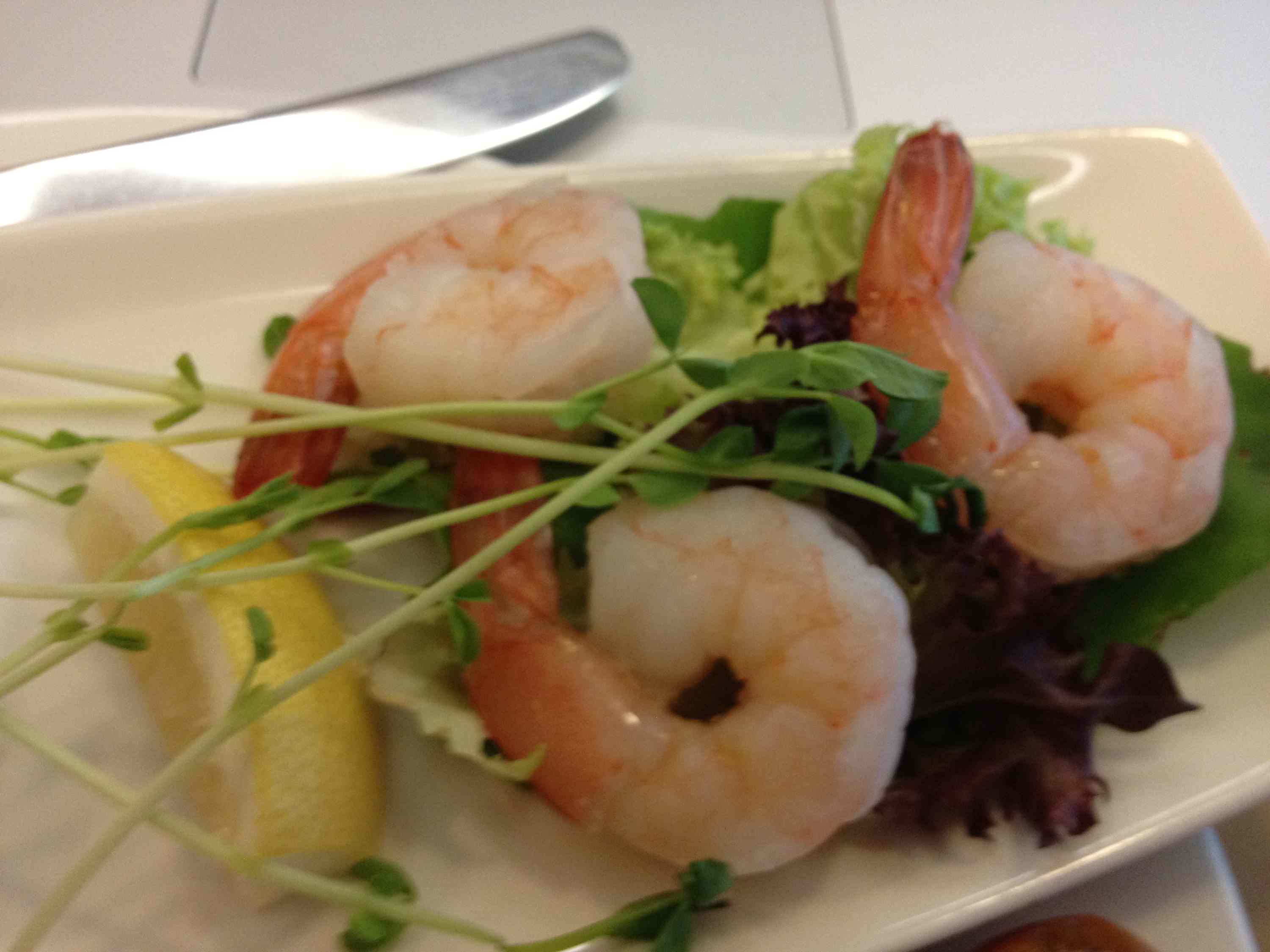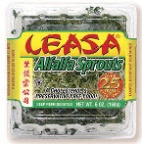Beginning in Dec. 2010, people started getting sick from eating raw sprouts on Jimmy John’s sandwiches, primarily in Indiana. After some 140 confirmed cases, the sprouts were linked to Tiny Greens Organic Farms, a producer based in Urbana, Illinois.
The U.S. Food and Drug Administration released a 6-page inspection report of Tiny Greens in Feb. 2011, and found the company grew sprouts in “soil from the organic material decomposed outside” without using any monitored “kill step” on it.
Other findings included:
• An “amphibian/reptile” was kept in the reception room of the firm, which adjoined the production area.?* The firm couldn’t show that its antimicrobial treatment for seeds, which was  not specifically described in the report, was equivalent to the recommended treatment with a bleach solution.
not specifically described in the report, was equivalent to the recommended treatment with a bleach solution.
• Employees stored their lunches, including such items as raw bacon, in the same cooler where finished sprouts were stored.?* Organic matter was seen on a table where sprouts were packaged, and a “biofilm-like buildup” was seen on sprouting trays after they were cleaned.?* What looked like mold was seen on walls and ceiling in a mung-bean sprouting room.?*
• Condensation dripped from the ceiling in production areas throughout the inspection period, which lasted close to a month.?* An outside lab that the firm used to test its water and sprouts used a method that was not validated for detecting Salmonella in those items.?
• FDA found a Salmonella isolate matching the outbreak strain, known as I 4,[5],12:i:-, in a sample of runoff water from the company.
In the midst of the German-centered E. coli O104-in-sprouts outbreak in May 2011, Tiny Greens owner Bill Bagby, said the nutritional benefits outweigh the risk.
“Sprouts are kind of a magical thing.”
“That’s why I would advise people to only buy sprouts from someone who has a (foodsafety) program in place” that includes outside auditors, Bagby said. “We did not have (independent (1).jpg) auditors) for about one year and that was the time the problems happened. The FDA determined that unsanitary conditions could have been a potential source of cross-contamination and so we have made a lot of changes since then.”
auditors) for about one year and that was the time the problems happened. The FDA determined that unsanitary conditions could have been a potential source of cross-contamination and so we have made a lot of changes since then.”
Independent auditors? Like the ones who said everything was cool, everything was OK, at Peanut Corporation of America (7 dead, 700 sick) and DeCoster eggs (2,000 sick)?
Auditors aren’t going to do much for sprout safety. But the optimism of the Magic Man is shared by the International Sprout Growers Association, which launched a campaign earlier this year to “make sprouts part of your healthy eating in 2012” and promoted the idea of sprouts as a “wonder food.”
Then another Jimmy John’s outbreak – E. coli O26 linked to raw sprouts in sandwiches favored by college kids – and the same actors surface on the social stage.
Bagby said this week, “We are not involved in any way, nor are we associated in any way with this current outbreak.”
The CDC website said the clover spouts used at the affected restaurants all came from two sprouting facilities using the same lot of clover seeds provided by International Specialty Supply, also known as ISS, in Cookeville, Tenn.
Bagby said, “I don’t buy from that company because it doesn’t have a sufficient decontamination procedure for the seeds.”
Bagby said Tiny Greens gets all its seeds from the Caudill Seed Co. in Louisville, Ky., because it uses a system to decontaminate the sprouting seeds.
“They use a process involving heat and a vacuum,” Bagby said.
Bagby said he was notified that Jimmy John’s has removed sprouts from its menu following this week’s finding by the CDC.
“It is ironic because sprouts have a high vitamin content, are rich in enzymes and phyto nutrients and strengthen one’s immune system.”
Not so much ironic as a painfully delayed recognition by Jimmy John’s that after 5 outbreaks related to sprouts on their sandwiches since 2008, maybe something should be done. A table of sprout-related outbreaks is available at http://bites.ksu.edu/sprouts-associated-outbreaks.
Jimmy John’s spokeswoman Mary Trader said on Thursday that the company is not releasing a statement at this time.
(1).jpg) Others, however, aren’t waiting.
Others, however, aren’t waiting.
Erbert and Gerbert’s Sandwich Shops, based in Eau Claire, Wis., has taken alfalfa sprouts off its menus at all outlets. The company has 53 locations.
“The decision to pull the sprouts from our menu system-wide is being made to protect the health of our guests,” Eric Wolfe, chief executive officer at E&G Franchise Systems, Inc., said in the release. “We value the well-being of our customers and felt removing all sprouts from our menu and sandwich line was the best way to eliminate the risk.”
WalMart stopped selling sprouts in North America in Oct. 2010.
NPR’s Nancy Shute chatted with Bob Sanderson, president of the International Sprout Growers Association, who talked about a number of possible sanitary treatments while concluding, “I’m hoping that the new rules [that are part of the Food Safety Modernization Act] will say, here’s what you have to do to be acceptable. That would free up the industry to come up with solutions.”
With repeated outbreaks, acceptable is a long way off.


.jpg) Two ill persons have been hospitalized, and no deaths have been reported.
Two ill persons have been hospitalized, and no deaths have been reported..jpg) so they might not be processed, handled, and stored as human food would. Conditions suitable for sprouting the seed also permit bacteria that might be present on seeds to grow and multiply rapidly.
so they might not be processed, handled, and stored as human food would. Conditions suitable for sprouting the seed also permit bacteria that might be present on seeds to grow and multiply rapidly. not specifically described in the report, was equivalent to the recommended treatment with a bleach solution.
not specifically described in the report, was equivalent to the recommended treatment with a bleach solution.(1).jpg) auditors) for about one year and that was the time the problems happened. The FDA determined that unsanitary conditions could have been a potential source of cross-contamination and so we have made a lot of changes since then.”
auditors) for about one year and that was the time the problems happened. The FDA determined that unsanitary conditions could have been a potential source of cross-contamination and so we have made a lot of changes since then.”(1).jpg) Others, however, aren’t waiting.
Others, however, aren’t waiting..jpg) Department of Food and Drug Administration was at his farm last week but didn’t find any contamination at the farm.
Department of Food and Drug Administration was at his farm last week but didn’t find any contamination at the farm.(1).jpg) week after the salmonella-in-clover sprouts was publicly reported, yet the head of a large food franchise like Jimmy John’s was absolutely clueless about microbial risks associated with sprouts.
week after the salmonella-in-clover sprouts was publicly reported, yet the head of a large food franchise like Jimmy John’s was absolutely clueless about microbial risks associated with sprouts.(1).jpg) such as common strains of STEC O26, typically cause milder illness. Currently, there are limited public health surveillance data on the occurrence of non-O157 STECs, including STEC O26; therefore, STEC O26 infections may go undiagnosed or unreported. Because non-O157 STEC infections are more difficult to identify than STEC O157, many clinical laboratories do not test for them. The STEC O26 PFGE pattern in this outbreak has rarely been seen before in PulseNet.
such as common strains of STEC O26, typically cause milder illness. Currently, there are limited public health surveillance data on the occurrence of non-O157 STECs, including STEC O26; therefore, STEC O26 infections may go undiagnosed or unreported. Because non-O157 STEC infections are more difficult to identify than STEC O157, many clinical laboratories do not test for them. The STEC O26 PFGE pattern in this outbreak has rarely been seen before in PulseNet.(2).jpg) distribution information indicates that sprouts grown from this seed lot were sold at a number of restaurant and grocery store locations in Iowa, Kansas, Missouri, and Wisconsin, and were likely distributed beyond these states. On February 10, 2012, the seed supplier initiated notification of sprouting facilities that received this lot of clover seed to stop using it. Investigations are ongoing to identify other locations that may have sold clover sprouts grown from this seed lot.
distribution information indicates that sprouts grown from this seed lot were sold at a number of restaurant and grocery store locations in Iowa, Kansas, Missouri, and Wisconsin, and were likely distributed beyond these states. On February 10, 2012, the seed supplier initiated notification of sprouting facilities that received this lot of clover seed to stop using it. Investigations are ongoing to identify other locations that may have sold clover sprouts grown from this seed lot..jpg) enhanced food safety controls and microbial intervention strategies that would result in safer sprouts, before re-introducing them for sale in our stores and clubs."
enhanced food safety controls and microbial intervention strategies that would result in safer sprouts, before re-introducing them for sale in our stores and clubs.".jpg) what he grows and very concerned about finding ways to make sure it’s safe industry-wide. The association started as a way to promote the nutritional value of sprouts, he said, but food safety has become more of its focus.
what he grows and very concerned about finding ways to make sure it’s safe industry-wide. The association started as a way to promote the nutritional value of sprouts, he said, but food safety has become more of its focus..jpg) champagne (which I usually pronounce Verve Cluque) like Dan Aykroyd in the Blues Brothers.
champagne (which I usually pronounce Verve Cluque) like Dan Aykroyd in the Blues Brothers.
 Salmonella sickened eight people in the U.S. Northwest who had eaten at a Jimmy John’s that used clover sprouts.
Salmonella sickened eight people in the U.S. Northwest who had eaten at a Jimmy John’s that used clover sprouts..jpg) Flowerdale north of Melbourne, and the other in Gippsland in Victoria’s south east.
Flowerdale north of Melbourne, and the other in Gippsland in Victoria’s south east. 1/8/12.
1/8/12.